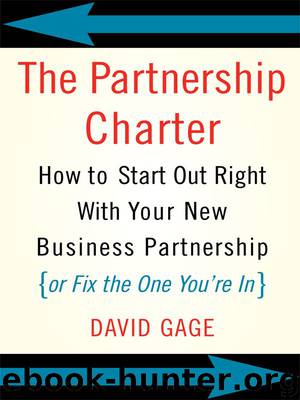The Partnership Charter: How To Start Out Right With Your New Business Partnership (or Fix The One You're In) by David Gage

Author:David Gage
Language: eng
Format: mobi, azw3
Publisher: Basic Books
Published: 2008-08-04T14:00:00+00:00
SETTING A COURSE FOR THE BOARD
Co-owners need to give their board sufficient direction from its inception to ensure that it begins on the right course. At the broadest level, partners should communicate their vision for the company and any shared values they want to guide the company. Owners should decide and then communicate clearly to the directors the time commitment expected of directors, required activities between meetings, and remuneration.
The partners may want to offer guidelines for actions that will seriously affect them, such as making acquisitions and divestitures, changing dividends or distributions, or altering debt structure or liquidity. They must ensure that the board clearly understands its range of responsibility and authority. It is better for the owners of a closely held corporation to give too much direction to their board at the outset than to give too little and then micromanage. Just as boards do not manage the executives, partners should not try to manage the board. Competent, strong board members would not take kindly to being micromanaged by shareholders.
After partners agree on their expectations of board members, they need to agree on how they will judge their performance, which is not easy. Unlike the CEO, who can be held responsible “for the numbers,” the board does not run the company, so it cannot reasonably be held responsible for how the company performs. Owners can evaluate the performance of board members based on stated expectations, such as attending meetings, serving on committees, responsiveness, holding the CEO accountable, and networking. At the same time, owners need to make sure they are giving directors the resources, information, and authority they need to do their job. If the board includes outsiders, that may require a degree of openness about financial data that owners of closely held businesses are not used to.
If the owners constitute the entire board, then of course evaluating the board is the same as evaluating themselves. Since I am an advocate of partners evaluating themselves as a team, this is just another angle on the same process. In addition to looking at how they perform as a group of co-owners, they look at how they are performing in their board capacity. The value of this exercise might be that they conclude that they never accomplish what a real board would and therefore need to rethink the idea that they can be the board.
The five founders of a transportation company in Illinois with $100 million in revenues and $11 million in annual profits had served as their own board since they opened the company’s doors. After twentyone years in business, two of the five partners had stopped working full time and a third had retired completely. All five were still on the board, but the meetings had been going downhill for about four years. It seemed that the better the company performed, the more contentious and alienated they became. As the partners’ day-to-day contributions to the company had changed greatly since they started, they fought about what they each deserved. They would argue, yell, and sometimes storm out of meetings.
Download
The Partnership Charter: How To Start Out Right With Your New Business Partnership (or Fix The One You're In) by David Gage.azw3
This site does not store any files on its server. We only index and link to content provided by other sites. Please contact the content providers to delete copyright contents if any and email us, we'll remove relevant links or contents immediately.
Life 3.0: Being Human in the Age of Artificial Intelligence by Tegmark Max(5534)
The Sports Rules Book by Human Kinetics(4372)
The Age of Surveillance Capitalism by Shoshana Zuboff(4272)
ACT Math For Dummies by Zegarelli Mark(4036)
Unlabel: Selling You Without Selling Out by Marc Ecko(3639)
Blood, Sweat, and Pixels by Jason Schreier(3600)
Hidden Persuasion: 33 psychological influence techniques in advertising by Marc Andrews & Matthijs van Leeuwen & Rick van Baaren(3537)
The Pixar Touch by David A. Price(3421)
Bad Pharma by Ben Goldacre(3414)
Urban Outlaw by Magnus Walker(3381)
Project Animal Farm: An Accidental Journey into the Secret World of Farming and the Truth About Our Food by Sonia Faruqi(3208)
Kitchen confidential by Anthony Bourdain(3074)
Brotopia by Emily Chang(3045)
Slugfest by Reed Tucker(2990)
The Content Trap by Bharat Anand(2911)
The Airbnb Story by Leigh Gallagher(2835)
Coffee for One by KJ Fallon(2616)
Smuggler's Cove: Exotic Cocktails, Rum, and the Cult of Tiki by Martin Cate & Rebecca Cate(2512)
Beer is proof God loves us by Charles W. Bamforth(2437)
